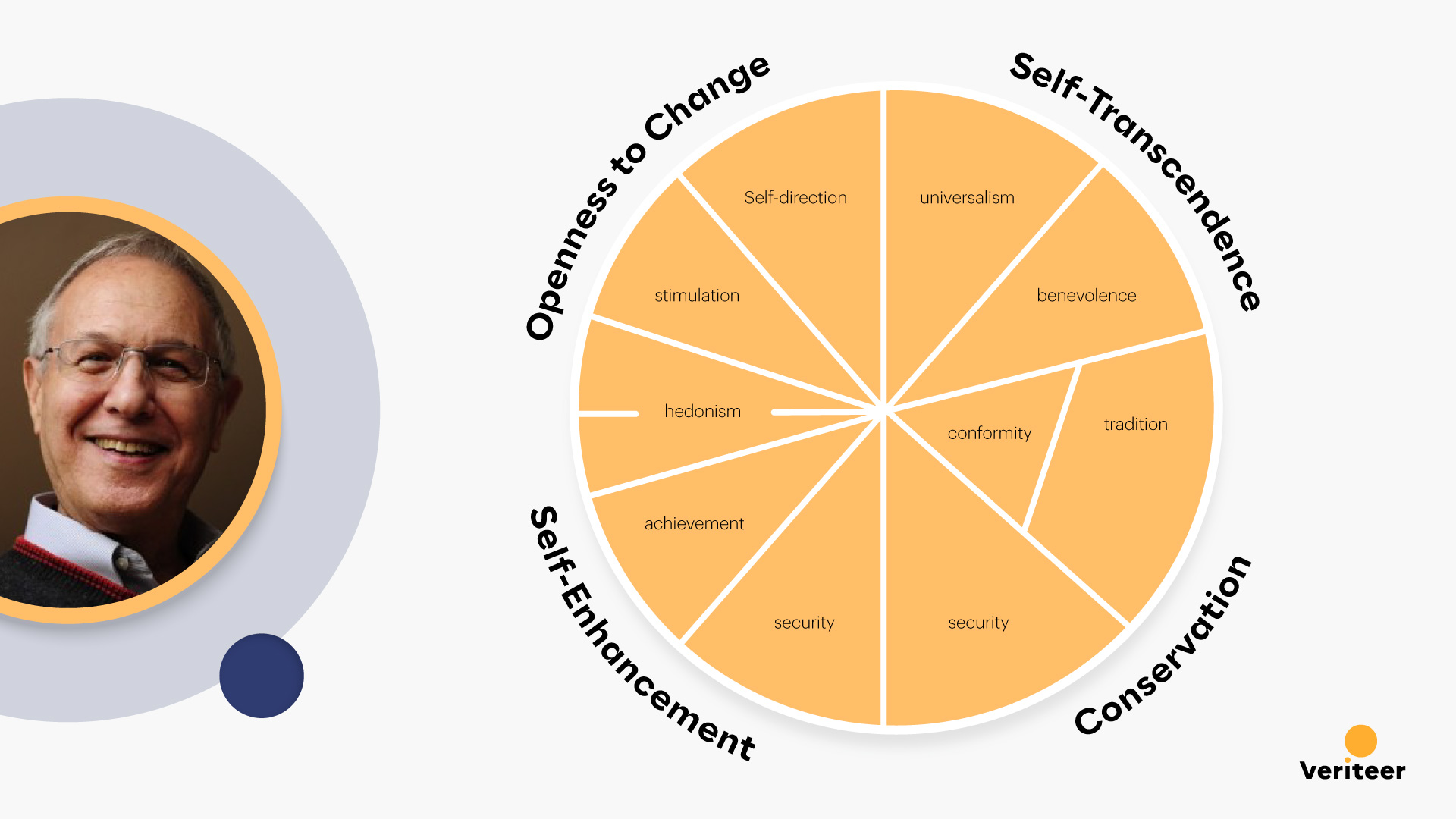How Communication Mishaps Derail Organisational Change
Organisational change is no small matter. It’s like building a giant Lego structure, with countless 'bricks' in play—business units, departments, functions, processes, and, most crucially, people.
Customer loyalty isn't just desirable, it's essential to your business’s growth. While tried-and-tested tactics like offering discounts and rewards can drive a burst of customer engagement, they often fail to capture the hearts and minds of consumers in an enduring way.
To truly differentiate themselves and make a lasting impression, brands need to develop a deeper understanding of the intriguing world of customer psychology. This article explores the complexities of human emotions, exploring how businesses can discover what really drives customers, and use this knowledge to form meaningful connections with them.
Sharing is caring: Why aligning your values with your customer’s is a must.
Customers are not just transactional beings; they’re complex and often instinctive. That’s why it’s important to consider the concept of ‘value’ from various perspectives when looking to elicit customer loyalty:
-
l data-leveltext="" " " " " " ">">" ">"etting value: customers can look for a balance of quality and affordability to feel like they’re receiving true value for their purchase.
l data-leveltext="" " " " " " ">">" ">"eeling valued: Beyond a product or service, making sure customers feel acknowledged, appreciated, and respected, is vital.
l data-leveltext="" " " " " " ">">" ">"haring values: Increasingly, customers commit themselves to brands who believe in and stand for the same ethical, social, and cultural values.
More than often brands confuse value with satisfaction, investing in immersive experiences or entertaining marketing activations to engage customers. While these efforts may initially drive increased spending, they fail to establish the essential foundation for enduring loyalty. If a similar experience is offered by a different brand, they won’t hesitate to switch.
Schwartz’s theory of basic values highlights how human values serve as the foundation for customer motivations, shaping their decisions and influencing their behaviour. Understanding these core values can empower businesses to connect with customers on a deeper level:
-
l data-leveltext="•" " " " " " ">">" ">"elf-enhancement: Customers driven by this value seek achievement, power, and success. Brands can resonate with them by highlighting features that elevate their status, offering opportunities for personal growth, or showcasing how their products can contribute to professional success or social status.
l data-leveltext="•" " " " " " ">">" ">"elf-transcendence: This value emphasises concern for the wellbeing of others and the environment. Businesses can connect with customers who share this value by demonstrating social responsibility through community initiatives, sustainable practices, or ethical sourcing.
l data-leveltext="•" " " " " " ">">" ">"penness to change: Customers motivated by this value embrace novelty and seek new experiences. Brands can engage them by introducing innovative products, offering personalised experiences, or tapping into their curiosity and sense of exploration and adventure.
l data-leveltext="•" " " " " " ">">" ">"onservation: This value prioritises tradition, security, and conformity. Businesses can cater to these customers by ensuring a sense of familiarity and trust through reliable products, established brand heritage, or straightforward customer service experiences. This can be seen as a reason why purchase behaviours significantly change with cultural and socioeconomic landscapes. Eg: the rise of social commerce amongst younger generations, as they gravitate towards purchasing on platforms like TikTok and Instagram, where they feel familiar and comfortable.

Tell us how you really feel: The power of specific emotions.
While customer satisfaction is crucial, it is no longer the sole determinant of loyalty. Recent research by Forrester highlights that specific emotions play a far greater role in influencing loyalty than customer happiness. The research suggests that emotions such as trust, belonging, and even a sense of excitement or anticipation can have a profound impact on long-term loyalty.
Customers are increasingly seeking brands that not only meet their functional needs but also resonate with them on an emotional level. For example, a customer may remain loyal to a brand not simply because they are satisfied with the product, but because they trust the brand's values and feel a sense of belonging to its community.
Here are some key emotions that can significantly impact customer perception:
-
l data-leveltext="" " " " " " ">">" ">"eeling valued, appreciated, and respected: Customers want to be treated as individuals, not just transaction IDs. Demonstrating genuine care, actively listening to feedback, and acknowledging loyalty in personal, meaningful ways are crucial. Flooding inboxes with blanket marketing/promotional emails, for example may result in customers feeling that their needs and preferences aren’t really being considered. When a Warby Parker customer received scratched glasses. Not only did they replace the lenses for free, but they also sent a handwritten apology note, a gift voucher, and cookies. This gesture went beyond simply resolving the issue and demonstrated genuine care and appreciation for the customer's business.
l data-leveltext="" " " " " " ">">" ">"eeling confident: Complex processes and unclear communication can create frustration and doubt. Brands can build confidence by simplifying interactions, providing clear and concise information, being transparent and offering resources to support informed decision-making. Showcasing user reviews, service/support information, etc. can help customers feel confident in making their purchase decision.
l data-leveltext="" " " " " " ">">" ">"eeling worthy: Evoking a sense of accomplishment or empowerment through doing business with your brand, through highlighting how the product or service helps customers achieve their goals, overcome challenges, or express their individuality can trigger this feeling of worthiness. A good example of a brand that excels at this is Duolingo. By gamifying language learning through incentivising learning progress through experience points, daily streaks, and league boards, they elicit a sense of accomplishment, self-improvement and achieving personal goals.
Making memories: how to craft emotional experiences across customer touchpoints.
Professor Daniel Kahneman says that people don’t choose between experiences. They choose between the memories of their experiences. To effectively tap into these key emotions and cultivate loyalty, businesses need to go beyond isolated attempts. Building a consistent and emotionally driven customer experience across all touchpoints is vital. Here are some key steps to achieve this:
-
l data-leveltext="" " " " " " ">">" ">" ">"lign your touchpoints: Ensure your brand identity, voice, and messaging resonate consistently across all customer interactions, creating a unified experience and fostering trust. Ensure to highlight the emotional value proposition of your product or service through evocative language and imagery, connecting with your customer's aspirations, desires and building positive associations.
l data-leveltext="" " " " " " ">">" ">" ">"ersonalise interactions: Brand interactions that feel like they are designed specifically for a single customer are more memorable. Surprise them with thoughtful gestures that align with your brand promise and exceed expectations. Consider incorporating gamification, personalised rewards, or targeted messaging to create delightful and memorable moments.
l data-leveltext="" " " " " " ">">" ">" ">"mbrace data-driven CX: Move beyond traditional metrics like NPS and satisfaction scores. Actively map the customer journey across all touchpoints, leveraging research, feedback, social media listening, and other data sources to gain comprehensive insights into customer sentiment. This data-driven approach removes any subjective bias and empowers you to design impactful initiatives that genuinely improve customer interactions. Remember, communication is a two-way street. Always acknowledge and communicate your actions in response to feedback received from your customers.
A brand that gets it right: IKEA
IKEA's 75-year reign as a retail giant isn't a coincidence. Their secret lies not just in affordable furniture, but in their profound understanding of the human psyche. IKEA weaves together emotional motivators, values, and experiences across all customer touchpoints, forging a loyal customer base that spans generations.
Catering to customer desires:
While their unique instore experience with interactive displays, makes customers fantasise about how a product will look in their home, creating “pre-memories” and emotionally bonding to the product, their maze-like layouts with one way traffic sparks a sense of surprise and discovery as they walk into a new section. The IKEA experience doesn’t just stop there! their self-assemble furniture fuels a sense of self-enhancement as customers "build" their lives. Even for those customers that shop from home, IKEA’s AR apps help them visualise how a product looks in their home.
Aligning values with experiences:
Beyond their unique and memorable shopping experiences, IKEA aligns with customer values through their commitment to sustainability, ethical sourcing, and inclusivity. Whilst their products are made from ethically sourced and recycled materials, they ensure that social responsibility doesn’t come with a cost. By designing their products from bottom-up, with innovative features and colours, they ensure that there is a something for everyone whilst not sacrificing on Trendy, Smart and Responsible for cost!
Crafting emotional journeys:
IKEA creates emotional connections across touchpoints. They show that they truly care but carefully crafting every step of customer journey. When they observed customers left the store during lunchtime, they set up inhouse restaurants in their stores resulting in customer staying longer in their stores. They don’t stop there, they also have kids play and nursing areas, baby food warming stations, etc making it easy families to shop, showing that they truly care!
Stay true to yourself!
Any brand can learn to build loyalty through emotional connections no matter how small or restricted by budget or resource.
The key is to figure out what your customers really care about and being authentic in showing you care about them. You can start with,
-
l data-leveltext="" " " " " " ">">" ">"ractice empathy: Practicing empathy goes a long way. Use empathetic language in all communication channels, from email to social, to in-store and POS assets. Put yourself in your customers’ shoes, showing understanding and consideration for their concerns, and express appreciation for doing business with you.
l data-leveltext="" " " " " " ">">" ">"o beyond data: Supplement traditional CX metrics with in-depth open-ended interviews, social listening, and customer feedback, to uncover the motivations, pain points, and emotional responses of your customers experience throughout their journey.
l data-leveltext="" " " " " " ">">" ">"ersonalise Interactions: Tailor your messaging, product recommendations, and service experiences to resonate with each segment's unique emotional needs and aspirations. For example, you can Utilise data to greet customers by name, offer relevant recommendations based on their purchase history, and provide proactive support.
l data-leveltext="" " " " " " ">">" ">"nder-promise, over-deliver: Exceed expectations by offering unexpected gestures that demonstrate genuine care and appreciation. This could involve personalised thank-you notes, discounts, or surprise upgrades. You could also leverage loyalty programs and gamified elements to create moments of delight.
l data-leveltext="" " " " " " ">">" ">"e authentic: Understand the values that resonate most with your target audience and integrate them into your brand identity, messaging, and social initiatives. This creates authenticity and fosters emotional connection with customers who share those values. Most importantly, be yourself! Don't try to be something you're not. By understanding your customers and staying true to your own values, you can build genuine connections that will last much longer than any fancy marketing campaign.
Remember, customer loyalty isn't about magic tricks or one-off gimmicks, it's about consistency, hard work, understanding people, and always being willing to learn and improve. The willingness to empathise with your customers and truly fulfil their needs, is not just the responsibility of customer service teams but the entire organisation.
Ready to unlock the true potential of your customer base? Don't settle for generic interactions – join our Customer-Centric Growth Accelerator Programme designed specifically for start-ups and scaleup who want to put customers at the heart of their business and build a brand that customers love!
Limited spots available – secure yours now!
Author: Vikram Sagi
Expertise: Strategy Consultant | Empowering Brands to Thrive in Evolving Markets
Connect: LinkedIn |

